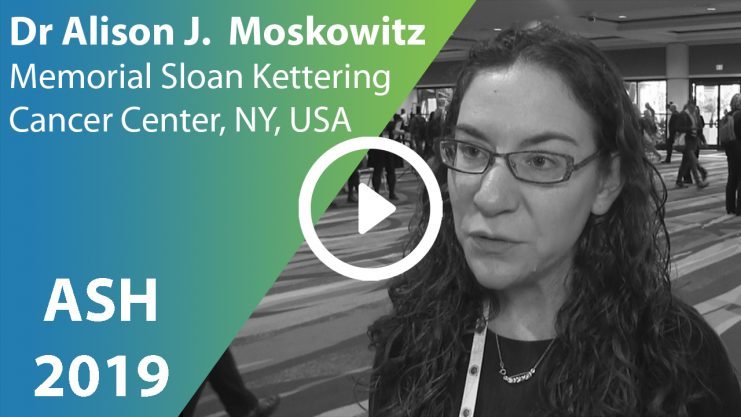Advertisment
Immunotherapy drugs show promise in lymphoma

Dr Alison J. Moskowitz (New York, USA) and Dr Graham Collins (Oxford, UK) review the long-term follow up data from brentuximabvedotin and nivolumab for R/R Hodgkin lymphoma
Written by Thomas R. Collins
The bispecific antibody mosunetuzumab showed some complete responses in relapsed/refractory aggressive B-cell non-Hodgkin lymphoma in a trial with patients who were considered to have no other available therapy that could be expected to improve survival, according to findings presented t the American Society of Hematology annual meeting.
The drug also produced responses in patients who had received prior CAR T-cell therapy, said Stephen Schuster, MD, director of the lymphoma program at the University of Pennsylvania. (1)
Mosunetuzumab is a full-length, fully humanized IgG1 bispecific antibody designed for T cell activation, redirection of T cells for elimination of B cells. The drug is “off the shelf,” with no ex-vivo process required.
Researchers enrolled 270 patients, including 180 with aggressive non-Hodgkin lymphoma (NHL), 85 with indolent NHL.
The objective response rate (ORR) among the aggressive NHL patients was 37%, with a complete response rate (CRR) of 19%.
For patient who’d received CAR T-cell therapy, an OR was seen in 7 of 18 patients (39%) with a CR in 4 of the 18 (22%).
The ORR for indolent NHL patients was 63%, with a CR of 43%, he said.
Grade 3 or 4 adverse events occurring in at least 5% of patients included neutropenia in 22%, hypophosphatemia in 13% and anemia in 9%, Dr. Schuster said.
“Mosunetuzumab monotherapy,” Dr. Schuster said, “exhibits a promising benefit-risk profile in patients with relapsed/refractory B-cell lymphomas, and achieves complete responses in high-risk patient populations.”
He said the immediate plan in the pursuit of regulatory approval is to look at the unmet need for patients who’ve had CAR T cells and not responding, as happens with about two-thirds of those patients, and compare mosunetuzumab to alternatives.
“Up until now that’s been a group of patients that we’ve not had much success in,” Dr. Schuster said. He also said the drug might be an easy way to redirect T cells to bind to more than one antigen, potentially enhancing CAR T cell therapy responses.
He didn’t rule out the possibility of the therapy being used as bridging for patients waiting for CAR T cell therapy.
“I can tell you having been pre-treated with this does not preclude efficacy of CAR T cells subsequently.”
In other immunotherapy findings in lymphoma, two-year results from an open-label trial of brentuximab vedotin (BV) and the checkpoint-inhibitor nivolumab (nivo) in relapsed/refractory classic Hodgkin lymphoma patients showed that patients having a complete response (CR) or partial response (PR) had higher levels of CD30 expression before treatment compared to those who either didn’t respond or had progressive disease.
“BV depletion of these populations may have a role in the clinical mode of brentuximab vedotin plus nivolumab,” researchers said.
Alison Moskowitz, MD, clinical director of the lymphoma inpatient unit at Memorial Sloan Kettering Cancer Center, who presented the findings, added that “responses were observed across the entire range of CD30 expression.”
“These data support the continued investigation of brentuximab vedotin plus nivolumab as a potential treatment option,” she said.
In the trial (2), 91 patients received 4 cycles of BV and nivo, with some patients receiving the drugs on separate days in the first cycle and then together in the last 3, and others receiving them concurrently in all 4 cycles. Eighty-six patients completed all 4 cycles. Patient could proceed to autologous stem cell transplant after investigators assessed their response to the treatment.
The treatment resulted in sustained responses, with a 2-year progression-free survival rate among those receiving ASCT after treatment of 92%, at a median follow-up of 24.2 months for all patients.
The most common adverse events were nausea, infusion-related reactions, fatigue and diarrhea, but almost all of them were Grades 1 or 2, Dr. Moskowitz said. Three patients had Grade 3 infusion-related reactions, including pruritis, syncope, dyspnea and urticaria.
1) Schuster S, Bartlett N, Assouline S, et al. Mosunetuzumab Induces Complete Remissions in Poor Prognosis Non-Hodgkin Lymphoma Patients, Including Those Who Are Resistant to or Relapsing After Chimeric Antigen Receptor T-Cell (CAR-T) Therapies, and Is Active in Treatment through Multiple Lines
Abstract 6. Presented at the American Society of Hematology annual meeting. December 8, 2019.
2) Moskowitz A, Advani R, Bartlett N, et al. Brentuximab Vedotin and Nivolumab for Relapsed or Refractory Classic Hodgkin Lymphoma: Long-Term Follow-up Results from the Single-Arm Phase 1/2 Study
Abstract 238. Presented at the American Society of Hematology annual meeting. December 7, 2019.





